Live" Lai Xiangyin "Island" new book sharing session: history and regeneration
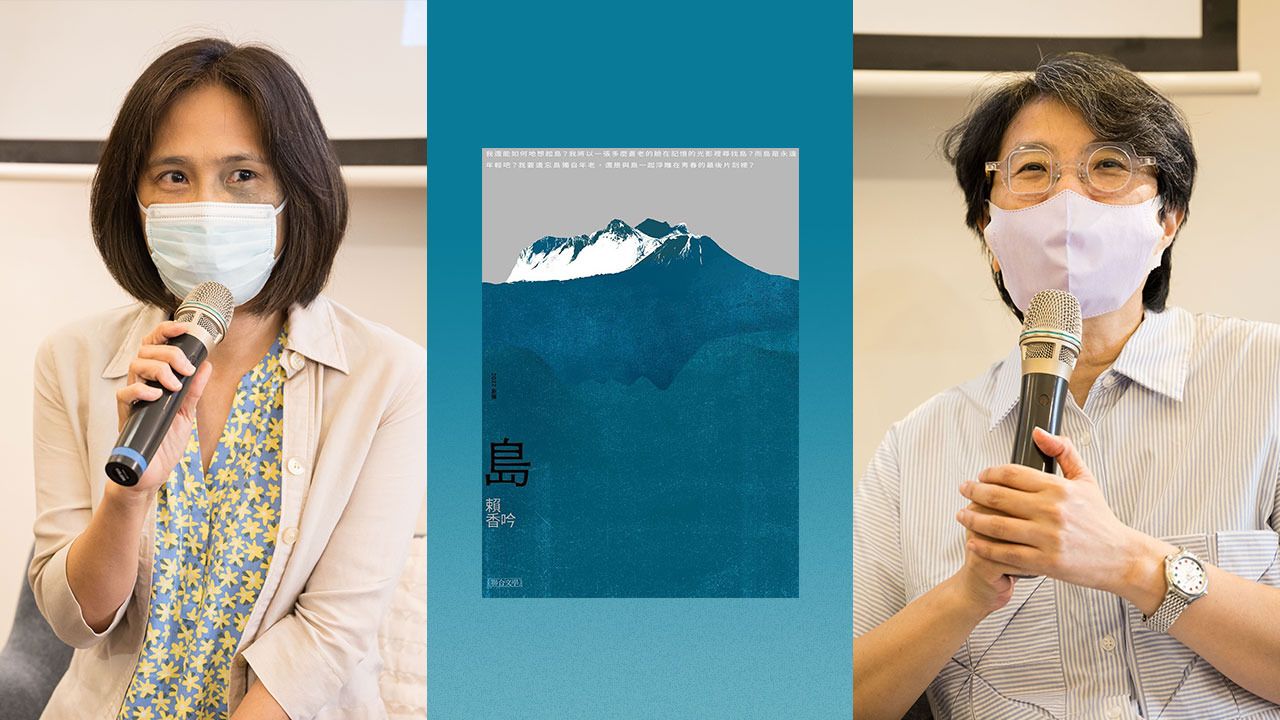
Written | Lin Wenxin (writer) Photography | Zhang Zhenzhou
The novel "Island", which was published in 2000, has a new edition this year. The writer Lai Xiangyin recently talked with Fan Mingru, a distinguished professor of the Taiwan Institute of Literature, National Chengchi University, on the topic of "History and Rebirth".
At the opening, Zhou Zhaofei, editor-in-chief of United Literature Publishing House, first talked about the version of "Island" - the 2000 edition of "Island" included Lai Xiangyin's creations from 1987 to 2000. This book will be re-published in 2022, and some readers may think that this is just a re-launch of an old book. Zhou Zhaofei emphasized that the new edition contains 4 more novels, and the theme arrangement is also different. When the new version of "Island" was added to the new work, the various works could be integrated with each other, and "this book was officially completed."
➤ Ending with Thirty Years: Between the Old and the New in "Island"
In terms of the time span of the collection of novels, it took Lai Xiangyin more than 30 years to complete this work. Zhou Zhaofei said that when she read Lai Xiangyin's works in the early 1990s, she could feel that she had a different vision from that of her contemporaries—the emerging novels at that time seemed to be closer to the theme of urban novels. In the chapters such as "Lan Zhe", the exploration of Taiwan's history has been carried out, which left a deep impression on Zhou Zhaofei.
The various series of "Island" show Lai Xiangyin's attention to various issues at different levels. The new version of "Island" can be said to be a complete period. This period is not only for Lai Xiangyin's personal creation, but also marks the Taiwan's history and political development have reached different stages.
In order to discuss the new book with readers, Lai Xiangyin recalled the mood and time and space of writing "Island" in the 1990s. The last Taiwan Strait crisis happened in 1996, which is far away from today's time and space background. From this point of view, Lai Xiangyin said: "The international situation that seems to be similar may be called accidental, or it may be called fate."
"Island" is a farewell to the 90s. Regarding farewells, Lai Xiangyin said that any farewell must happen twice—the first time is to turn away and walk away, which is a scene that cannot be sorted out; but most people will inevitably encounter a second farewell. In the second farewell, We were able to clean up the "predicament" that we couldn't sort out last time.
Lai Xiangyin explained the Japanese word "predicament" with "the problem of fate". She believes that the postscript written in the 1990s was her first goodbye; and now the new edition is republished, it is her second goodbye. "Farewell" echoes the "period" mentioned by Zhou Zhaofei. Lai Xiangyin said: "The second farewell in life is usually a period, which means that this matter is almost over and it's time to do something else." For Lai Xiangyin, the first The second goodbye is the real leap, so this book seems to be a hill that took 30 years to finally cross.
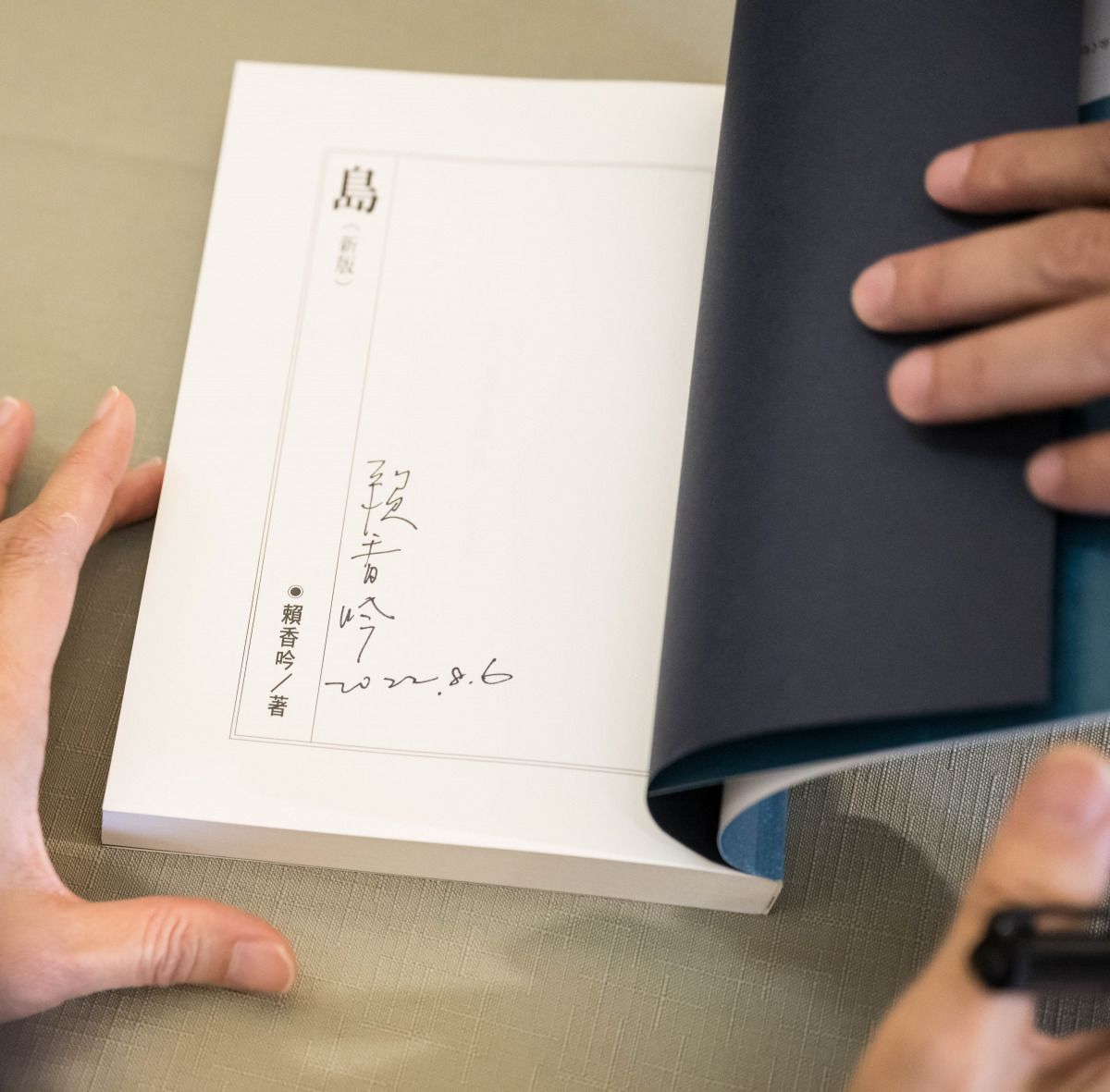
As for the reason for farewell, Lai Xiangyin explained from the "era" and "individual": From the perspective of the era, when "people are in the game", it is actually difficult to truly grasp how the event will be recognized and defined. Some chapters of "Island" describe the "insider's point of view" in the past time and space, but for Lai Xiangyin personally, this work symbolizes the early stage of writing, the heart of challenging form and language. In other words, "Island" shows the reflections of Taiwan's "insiders" in time and space.
In terms of language experiments, it shows Lai Xiangyin's personal ambitions in the early stage of writing: she does not want to directly write about politics, and she does not want to use the emerging words such as "nation" and "history", but intends to use daily stories, gender relations, to wrap the proposition given by the times.
Despite this ambition, Lai Xiangyin admitted that looking back today, the writing at that time seemed to "go too far", beyond the ability of ordinary readers, and it was relatively difficult to master the dissemination of works or the expression of ideas.
"Going too far" is the key word. Lai Xiangyin said that some chapters could not satisfy her because of such writing. She felt that she was not mature enough at that time, and many works, such as "Wildland 1989", "Love Letter 1991" and "Wedding 1996", were put on hold. The smell of the history of the times, but the completion of these works is already in 2016 and 17.
➤ "Island" as the history of Lai Xiangyin's literary cultivation
The interviewer, Professor Fan Mingru, made observations from the college. She said that in order to carry out Lai Xiangyin's research, she had read a lot of other people's research results, and found an interesting phenomenon: "Island" is the work most often discussed by researchers.
"Island" includes Lai Xiangyin's transitional works from studies to maturity, which contain rich elements and themes. Like seeds, even though there may be more mature works in the later period, those issues have germinated as early as in the chapter of "Island", and this may be the reason why "Island" will be mentioned repeatedly. Fan Mingru pointed out that Lai Xiangyin is already a mature author at this moment, and "Island" marks the origin of her novel.
Fan Mingru sees the new version of "Island" as a kind of metaphor for Taiwan's situation: Taiwan has always been changing and growing, and many of its wounds can be healed and even thriving. Back to literature, Fan Mingru pointed out that the new version of "Island" should be regarded as a comprehensive presentation of Lai Xiangyin's writing history - Lai Xiangyin's writing is coherent, and she often draws one or two elements from her previous works to continue her creation. , making the concept of the previous book more complete.

The four newly added novels in "Island" are extracted from another novel that has been out of print, and this time the arrangement is relatively complete, so that readers can fully see the development of the author's creative career. Perhaps it can be said that the new edition of "Island" reveals a novelist's history of cultivation from infancy to maturity.
Looking more closely, Lai Xiangyin's novels seem to be inseparable from the labels of "political novels" and "historical novels", but her uniqueness is that the novels' depiction and reflection on Taiwan's democratic movement are not "big internal propaganda types". . Among them, "Rain Bean Tree" is a chapter named by Fan Mingru. She believes that this work symbolizes the maturity of Lai Xiangyin's writing. When she first read it, she would have thought it was a work "written to the top", but she did not expect that the "White Portrait" published at the beginning of the year was pushed to another level.
This connection makes Fan Mingru believe that Lai Xiangyin's silence in the middle of writing is for the next leap, and he is full of expectations for Lai Xiangyin's future creations. However, Fan Mingru also laughed and said that she still wanted to take this opportunity to make some "customer complaints" - because Lai Xiangyin's novels often "cross-share", for researchers, it involves the issue of biography, and there seem to be many " A literary graduate student who struggles with Lai Xiangyin's works", so Fan Mingru especially asks everyone to pay attention.
➤ Must be naive and suspicious of fictional instincts
Lai Xiangyin will digest the era, background and history, and transform it into an atmosphere. The era seems to become the air of the novel and the background of the characters, and then use the characters' stories to set off the whole. Such novels are sometimes not easy to read, and the year of publication is attached to the end of each article in the new edition of "Island", so researchers can track and complete a timeline in their mind, corresponding to the year of publication and the content of the novel itself. How to arrange the genealogy in the era is also a challenge for researchers by Lai Xiangyin.
Fan Mingru also asked Lai Xiangyin questions. She mentioned that Lai Xiangyin's political novels had "prophecies come true" many times. Looking back on it today, on the one hand, she would be surprised by Lai Xiangyin's insight and early wisdom, on the other hand, she felt distressed and sad for the novelist. How does Lai Xiangyin understand this phenomenon?
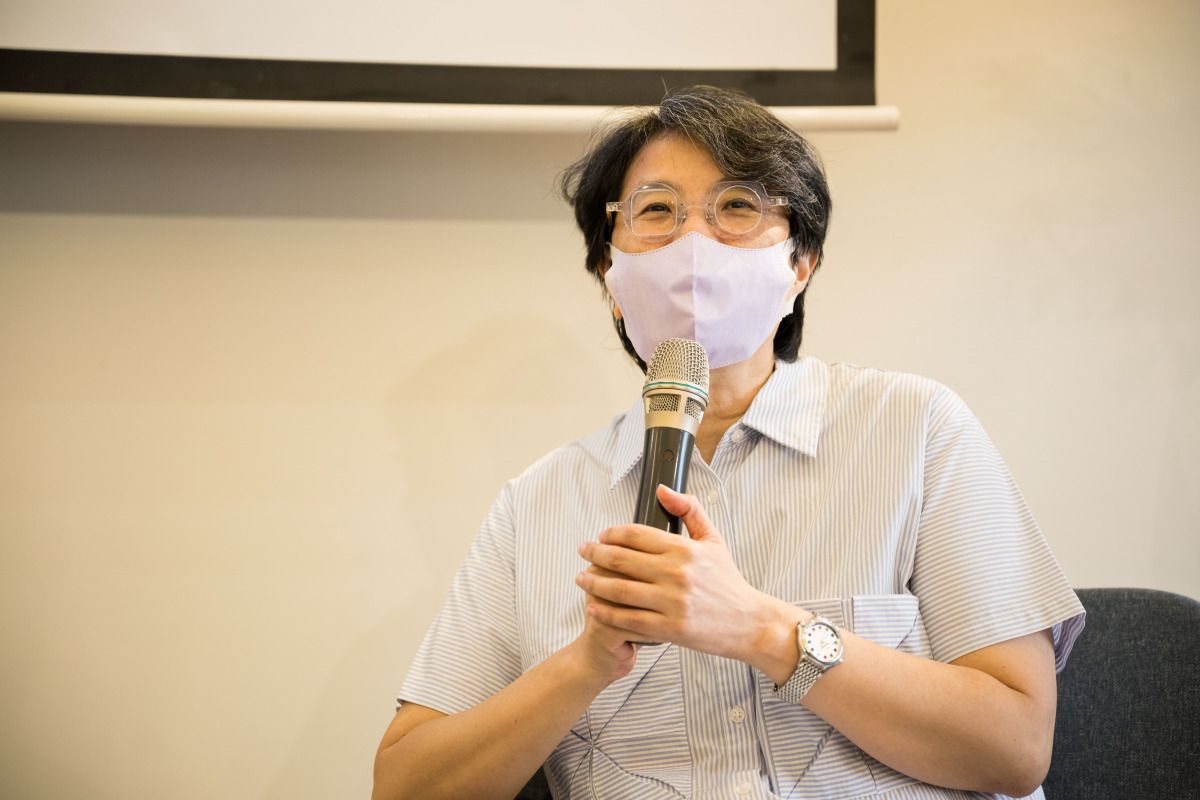
Lai Xiangyin responded that there are "wide-angle" and "narrow-angle" answers to this question. Starting from the "wide angle", Lai Xiangyin believes that "literature is a kind of hunch", and "the style of novel requires the writer's observation and understanding of human nature." The so-called human nature is about human weaknesses and shortcomings. Novelists must train their literary premonitions to make judgments through long-term observation and accumulated knowledge.
The aspect of "Narrow Angle" is about Lai Xiangyin herself. She does not use early wisdom to describe herself, but emphasizes the two qualities of "naive" and "doubt" - Lai Xiangyin believes that these contradictory words are in the person who writes. Often appear at the same time, and on the long road of writing, it is these two qualities that must be kept carefully: because of innocence, the writer is curious about the phenomenon and concerned about the world; doubt makes the writer not follow blindly. She also said to herself that because of these two qualities, she was placed in the position of a marginal observer.
In response to Fan Mingru's comment that the novel was not easy to read, Lai Xiangyin talked about the time and space of the writing of "Island" in the 1990s, explaining that it happened to be a moment when private history and public era intersected. Continuing the topic of "the challenge of writing", Lai Xiangyin said that he grew up reading the works of the martial law era. Although the 1980s was called the golden age of Taiwanese literature in the history of publishing, there are still many fixed paradigms in those works, no matter how brilliant Whether or not it is presented in the framework of martial law.
On this basis, Lai Xiangyin wanted to try something different when he encountered Jailan. At the same time, after the lifting of the law, various trends of thought in the West poured in, subtly stirring up people's literary cells. Under various factors, Lai Xiangyin once again said that at that time, he "went too far" and "literate too many things", so that many readers got lost in the works.
As a supplement, Lai Xiangyin reminded that people standing in the new 1920s may not feel the rapid influx of new elements and new content in the 1990s; The carrier, or social organization, structure, value, etc., are still old. Therefore, Lai Xiangyin thinks that "Island" may be understood as "the confusion and conflict caused by the new content in the old carrier", which is also the emotion she will have when she rereads the book now.

However, such a process may still be necessary. "Island" is called "Removal of Yanyan 1.0" and "Democracy 1.0" by Lai Xiangyin. This work reflects the groping, collision and disillusionment experienced by everyone in the era. This is their fateful problem. Later, Lai Xiangyin called the Sunflower Movement "the next generation of martial law." She said that through this movement, the younger generation can feel that the democratic movement itself is full of ambiguities and cannot be explained to the end with one principle and one rule. When Taiwan experienced the Sunflower Movement, the social structure, human resources and values changed, and all the completed and unfinished things would gradually happen in literature.
If we use "Island" to imitate such a situation, that is, Lai Xiangyin tried to reflect the various phenomena that he observed or confused himself after experiencing understanding. Among them, there are either incapacity, lack of energy, or the gap between the concept and the reality, and these problems can also be seen in the works related to the Sunflower Movement. In other words, "Island" was written by Lai Xiangyin from the position of literature, with the novelist's "innocent and skeptical instinct".
➤From "separate" to "not separated": novels must have their ethics
Later, Fan Mingru asked questions from Lai Xiangyin's series of works. She explained that she just talked about the difficulty of reading Lai Xiangyin's novels. The key point is that the past novels have a "separation effect", that is, the display of a sense of distance - not only the author is far away from the characters in the novel, but the author stands alone and objectively. Far, even above, push the character to the front.
However, in the new work "White Portrait", this sense of distance has disappeared. The author seems to stand with the characters of the novel, showing the special emotions of political novels: from the characters' feelings, faces to the ideological structure, they become extremely resonant and The sense of immersion impressed Fan Mingru deeply. From "separation" to "non-separation", there is a huge change, which is also very curious.
Lai Xiangyin believes that the "separation" in Fan Mingru's mouth may be derived from the skeptical instinct of the novelist. She further explained: "The greatest self-consciousness and kindness of a novelist is not to stop easily until you can't grasp it. A character is not a doll, you can't easily make him live, make him die, or directly say that he is good or evil, You can only show what he is."
Precisely because of this attitude, when Lai Xiangyin had doubts, he had to be restrained and restrained in the depiction of the characters. She believes that there must be ethics in novels. This ethics is not the so-called ethical law in moral education, but a compassion that cannot bear to treat characters arbitrarily.
Lai Xiangyin hesitated at first, but then firmly stated that whether "ethics" or "compassion", although these words sounded outdated, they were still the basic requirements of novelists: "Your innocence leads to your curiosity about everything in the world, which It is the starting point of writing. The novel should absorb the trivialities of everything in the world; and doubt determines your sharpness and depth, and determines your observation position and angle. But what remains in the end is compassion. Treat the characters as people, If your character doesn't like to be treated like this, you have no right to treat him like this." The love for the character is the basic guarantee for Lai Xiangyin to deliver the work to the readers.
The reason why the early works have the so-called "separation distance" is because Lai Xiangyin realizes that he is unable to judge and is unwilling to judge. She thus takes a long distance, reminding herself and the reader that we, like these characters, do not know where we are going.
So why not now? Lai Xiangyin said that writers should not only ask readers to grow, but if literature is to improve, writers should be asked to grow. On this point, she also wants to ask readers to be tolerant: "Writers need to grow, please give writers room to grow." Writers need to grow to be complete, and the conclusion of the coffin is quite cruel to Lai Xiangyin.
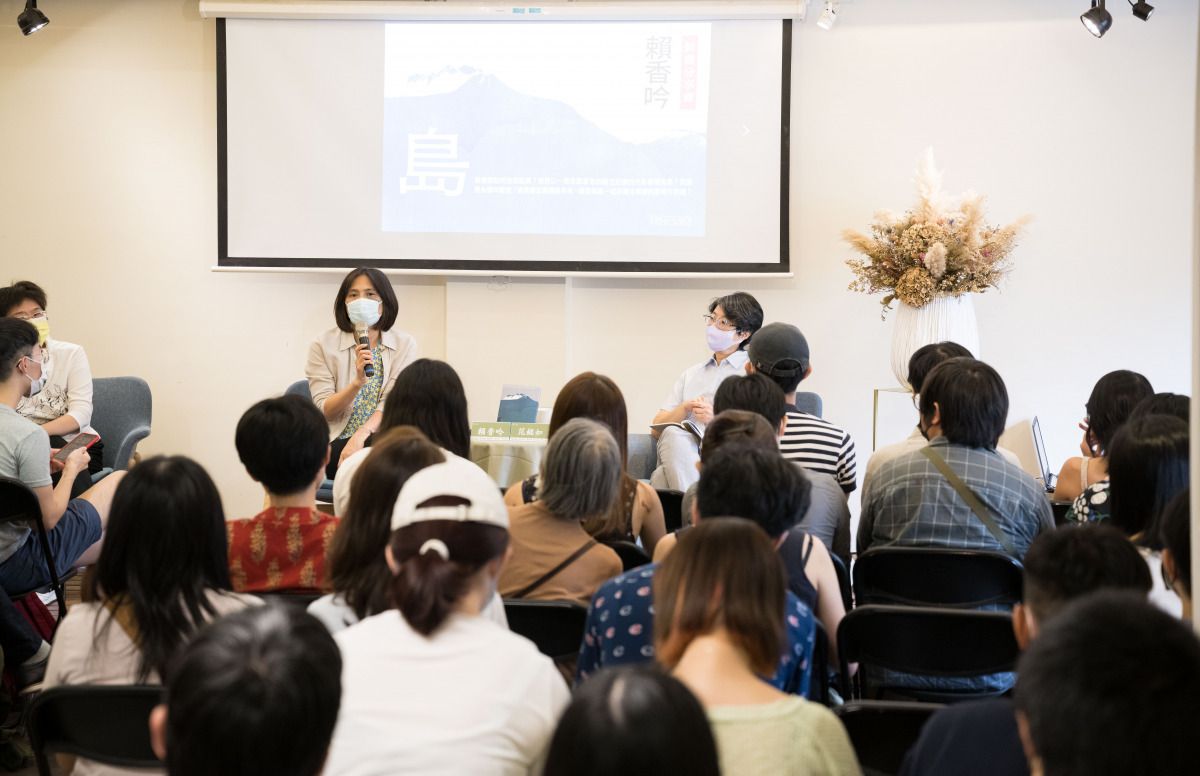
After the lifting of the martial law, literary studies have gained a freedom to incorporate progressive literature into the evaluation system, but this is both fortunate and unfortunate - fortunately, the creators are no longer alone and can interact and respond with readers; but unfortunately The point is that it is not good for the development of writers to let literature be too disturbed by external evaluation.
The so-called writers need to grow, the key is whether the writing is speculative or not. Lai Xiangyin said with a smile: "If you want to enter the field of literary creation, it is best to know from the beginning that this is a stock that can be held for a long time to recover profits."
Of course, Lai Xiangyin also understands that due to the dilemma of the current publishing market and real conditions, the growth of writers is often short-lived, or even died prematurely. However, if we look at novel creation in the history of literature, the writer's later works are indeed worth looking forward to. Lai Xiangyin takes herself as an example. She believes that when she was in her 40s or 50s, "the storm of doubt has dissipated." This may be the reason why "White Portrait" is not separated: she has been transformed from her own growth. Whether it is the opinion of life or self-awareness, the writer will not gain a sense of proportion and opinion until middle age. As the doubts dissipated, she believed that she could stand a little more stable, and she became more confident about the role, the materials to be processed, and the angle of entry.
When there is more compassion than doubt about the character, distance is no longer needed, but just description: "It's really like a portrait, I just draw the characters to the readers with one stroke and one stroke. What I think about is how to draw the characters. How to better match the eyes and mood of the characters. In this portrait, I no longer have any doubts.”
In the final Q&A session, Lai Xiangyin reminded that although her works will be called "political novels", and now is an important and popular stage in the construction of Taiwan's main cultural identity, "literature should be careful, literature is not a tool", She emphasized that there can be many forms of political action, but if writers want to hand over literary works, they must return to the spirit and aesthetics of literary works. ●( The original text was first published on the OPENBOOK official website on 2022-08-17)
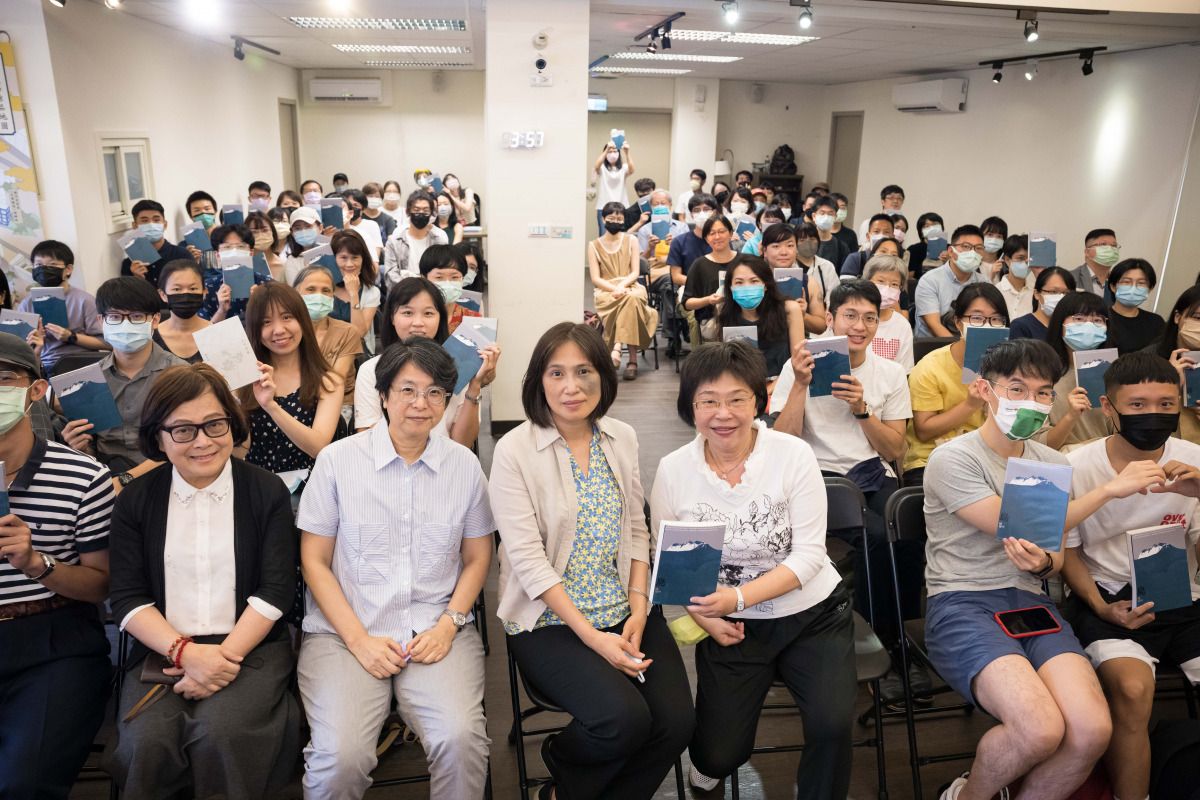
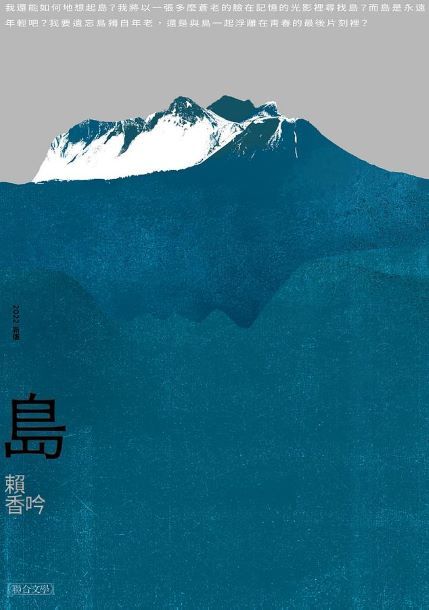
Island <br class="smart">Author: Lai Xiangyin Publishing: United Literature
About the Author Lai Xiangyin <br class="smart">Born in Tainan in 1969, studied in Taipei and Tokyo, and now lives in Berlin. Worked in bookstores and museums, and now specializes in writing. He published his first novel in 1987, and his work has won the United Literary Novel Award, the Nine Geely Annual Novel Award, the Wu Zhuoliu Literature and Art Award, the Taiwan Literature Golden Award, and the Golden Tripod Award.
He is the author of "White Portrait", "Love Before Dawn: Landscape of Japanese Occupation of Taiwan Fiction", "The Death of Wen Qing", "Afterwards", "Prehistoric Life", "Landscape in the Fog", "Island" and other books.
Like my work? Don't forget to support and clap, let me know that you are with me on the road of creation. Keep this enthusiasm together!

- Author
- More